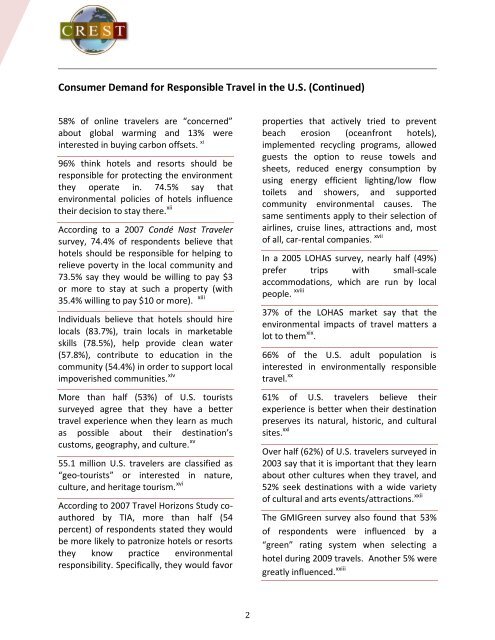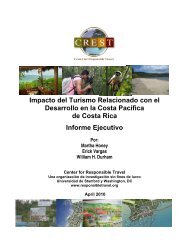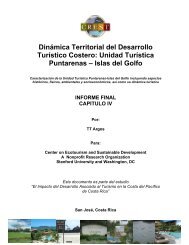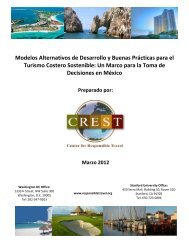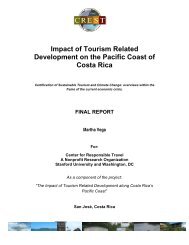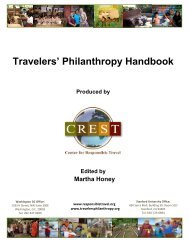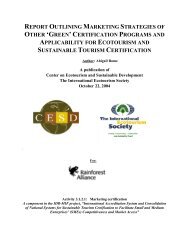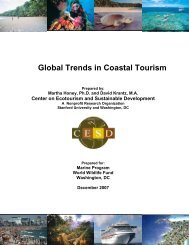Fact Sheet - Global Ecotourism - Center for Responsible Travel
Fact Sheet - Global Ecotourism - Center for Responsible Travel
Fact Sheet - Global Ecotourism - Center for Responsible Travel
Create successful ePaper yourself
Turn your PDF publications into a flip-book with our unique Google optimized e-Paper software.
Consumer Demand <strong>for</strong> <strong>Responsible</strong> <strong>Travel</strong> in the U.S. (Continued)<br />
58% of online travelers are “concerned”<br />
about global warming and 13% were<br />
interested in buying carbon offsets. xi<br />
96% think hotels and resorts should be<br />
responsible <strong>for</strong> protecting the environment<br />
they operate in. 74.5% say that<br />
environmental policies of hotels influence<br />
their decision to stay there. xii<br />
According to a 2007 Condé Nast <strong>Travel</strong>er<br />
survey, 74.4% of respondents believe that<br />
hotels should be responsible <strong>for</strong> helping to<br />
relieve poverty in the local community and<br />
73.5% say they would be willing to pay $3<br />
or more to stay at such a property (with<br />
35.4% willing to pay $10 or more). xiii<br />
Individuals believe that hotels should hire<br />
locals (83.7%), train locals in marketable<br />
skills (78.5%), help provide clean water<br />
(57.8%), contribute to education in the<br />
community (54.4%) in order to support local<br />
impoverished communities. xiv<br />
More than half (53%) of U.S. tourists<br />
surveyed agree that they have a better<br />
travel experience when they learn as much<br />
as possible about their destination’s<br />
customs, geography, and culture. xv<br />
55.1 million U.S. travelers are classified as<br />
“geo-tourists” or interested in nature,<br />
culture, and heritage tourism. xvi<br />
According to 2007 <strong>Travel</strong> Horizons Study coauthored<br />
by TIA, more than half (54<br />
percent) of respondents stated they would<br />
be more likely to patronize hotels or resorts<br />
they know practice environmental<br />
responsibility. Specifically, they would favor<br />
2<br />
properties that actively tried to prevent<br />
beach erosion (oceanfront hotels),<br />
implemented recycling programs, allowed<br />
guests the option to reuse towels and<br />
sheets, reduced energy consumption by<br />
using energy efficient lighting/low flow<br />
toilets and showers, and supported<br />
community environmental causes. The<br />
same sentiments apply to their selection of<br />
airlines, cruise lines, attractions and, most<br />
of all, car-rental companies. xvii<br />
In a 2005 LOHAS survey, nearly half (49%)<br />
prefer trips with small-scale<br />
accommodations, which are run by local<br />
people. xviii<br />
37% of the LOHAS market say that the<br />
environmental impacts of travel matters a<br />
lot to them xix .<br />
66% of the U.S. adult population is<br />
interested in environmentally responsible<br />
travel. xx<br />
61% of U.S. travelers believe their<br />
experience is better when their destination<br />
preserves its natural, historic, and cultural<br />
sites. xxi<br />
Over half (62%) of U.S. travelers surveyed in<br />
2003 say that it is important that they learn<br />
about other cultures when they travel, and<br />
52% seek destinations with a wide variety<br />
of cultural and arts events/attractions. xxii<br />
The GMIGreen survey also found that 53%<br />
of respondents were influenced by a<br />
“green” rating system when selecting a<br />
hotel during 2009 travels. Another 5% were<br />
greatly influenced. xxiii


